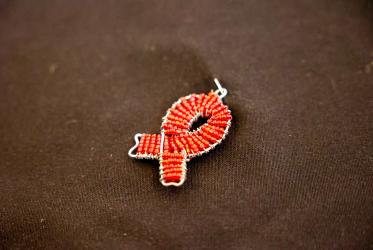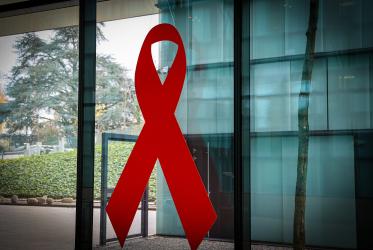Affected: a term used for the family, friends and other persons associated with someone living with HIV/AIDS.
AIDS ( Acquired Immune Deficiency Syndrome ): a group of signs and symptoms or a combination of diseases caused by the Human Immunodeficiency Virus (HIV), which impairs the body's ability to fight infection, making it especially susceptible to opportunistic infections, of which the most common include pneumocystis carinii pneumonia and certain cancers, such as Kaposi's sarcoma, a skin cancer.
AIDS test: a misnomer sometimes incorrectly used to refer to the HIV antibody test.
Focus group discussion: a method for group analysis and problem solving, stressing the role of the group in identifying its own problems, and seeking transformative solutions appropriate to the local situation (see participatory action research, below).
HIV ( Human Immunodeficiency Virus ): the virus that can eventually cause AIDS. People infected with HIV may look and feel well for a number of years before any opportunistic infections develop. Many people infected with the HIV virus are completely unaware of the fact, unless they decide to have a medical blood test. However, they can be carriers of the virus, transmitting it to other people.
HIV antibody test: a laboratory test made on a small sample of blood to detect whether the body has reacted to the presence of HIV by trying to protect itself against the virus through producing antibodies. Though the presence of antibodies indicates that a person has been exposed to the virus, their absence does not necessarily mean that the
person is not infected with HIV, since this reaction takes an average of three months after infection to show up in the blood. If the test is positive, the infected person will have been able to pass on the virus from the moment of infection. It is not possible to tell from this test when or how the person tested will proceed to AIDS.
HIV-positive (or seropositive ): a term indicating that the HIV antibody test on a person has indicated the presence of antibodies in the blood. If the test is positive, it means that the person has been exposed to HIV and that his or her immune system has developed antibodies to the virus.
Immune deficiency: impairment of the body's ability to resist infection.
Immune system: the body's natural defence system which protects it from infection by recognizing bacteria, viruses and diseases in general. It consists of cells that (among other things) produce antibodies, which can recognize materials as foreign to the body and then attempt to neutralize them without injury to the person's cells.
Incubation period: the period of time between infection by the disease-causing organism and the onset of signs and symptoms of the disease. In people with HIV infection, the average incubation period is seven to ten years.
Infected: a term used for a person who has the HIV virus within his or her body.
IVDU ( Intravenous Drug Use ): one of four main high-risk behavioural patterns resulting in HIV infection. Drug use may involve using and often sharing unsterilized needles and syringes that serve to transmit HIV.
Opportunistic infection: an infection caused by an otherwise harmless micro-organism that can become pathogenic when the host's resistance is impaired.
Participatory action research: a process of community-building and empowerment for identifying, analyzing and solving problems at the community level. This approach seeks practical, locally-appropriate (rather than abstract or "universal") solutions, and uses such
methodologies as key informant interviews, close local observation, survey questionnaires, rapid appraisal, and focus group discussion (see above).
Transmission: the spread of the disease-causing organism from one person to another. The major modes of transmission of HIV are penetrative sexual intercourse, shared contaminated equipment of intravenous drug users, transfusion of unscreened blood (blood which has not been tested) and from mother to unborn or newborn infant.
Terms to avoid
|
Terms to avoid |
Why to avoid them |
Use instead |
|
Carrying AIDS, AIDS carrier, AIDS positive |
These terms confuse two distinct phases: being infected with HIV and having AIDS. People can have AIDS, but they cannot "carry" it. |
HIV-antibody positive; peo ple with HIV. |
|
AIDS test |
The most commonly used test detects antibodies to HIV. There cannot be a test for AIDS; the diagnosis for AIDS is based on clinical symptoms. |
HIV antibody test. |
|
AIDS virus |
This term can lead to confusion be- tween HIV and AIDS. |
HIV (Human Immuno-deficiency Virus). |
|
Catch AIDS |
It is not possible to "catch" AIDS. Although it is possible to "catch" HIV, this is a misleading expression, be- cause it may suggest that transmission of HIV is similar to transmission of colds or flu. |
Contract HIV; become infected with HIV; become HIV- positive. |
|
AIDS sufferer |
Having AIDS does not mean being sick all the time. Someone with AIDS can continue to work and lead a normal life for some time after diagnosis. The term "suffering" is thus inappropriate. |
Person with AIDS. |
|
AIDS victim |
The language of "victim" suggests helplessness. |
Person with AIDS, person who has AIDS. |
|
Innocent victim |
This term implies that anyone else with AIDS is "guilty". |
|
|
High-risk groups |
The fact of being classified as a member of any particular group does not put anyone at greater risk; it is what he or she does, regardless of group, that may put him or her at greater risk. In other words, one should speak of risk behaviour, not of high risk groups. |
High-risk behaviour. |
This material has been adapted from Beverly Booth, "Health Professionals and the AIDS Epidemic: Say What You Mean and Mean What You Say", Contact, no. 136, Apr. 1994, pp. 10f.; and Guide to HIV/AIDS Pastoral Counselling, Geneva, WCC AIDS Working Group, 1990, pp.v-vii.





